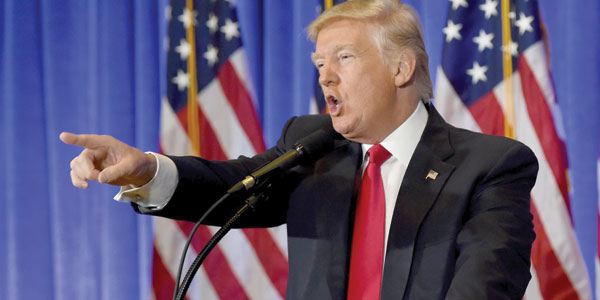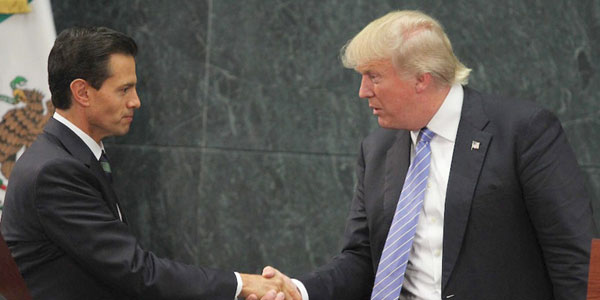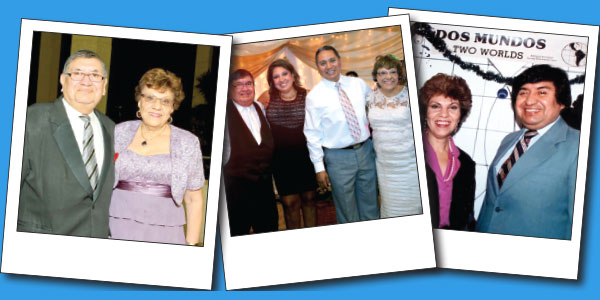
Volvió a ocurrir. En su conferencia de prensa más reciente, Donald Trump atacó a un periodista que quería hacerle una pregunta. Sí, dentro de muy poco, Trump será el nuevo presidente de Estados Unidos. Pero lo que Trump no entiende es que, para nosotros los periodistas, él no es nuestro jefe.
Durante la conferencia de prensa en Nueva York, Jim Acosta, corresponsal de CNN, trató de hacer a Trump una pregunta sobre el polémico informe de inteligencia que Trump recibió, el cual al parecer resumía la supuesta interferencia de Rusia en la campaña presidencial del año pasado. Al Presidente electo no le gustó la manera en que los medios habían cubierto el tema, particularmente en CNN, así que ni siquiera permitió a Acosta expresar su pregunta.
“Tú no”, le dijo Trump a Acosta. “Tu empresa es terrible”.
Acosta insistió: “Usted está atacando a nuestra organización de noticias. ¿Nos puede dar la oportunidad de hacerle una pregunta?”
Trump no cedió. “No seas maleducado”, le dijo el empresario. “No te voy a permitir hacer una pregunta. Tú reportas noticias falsas”.
De pronto, se oyeron unos aplausos; eran los empleados y asesores de Trump aplaudiéndole a su jefe. Ese gesto servil me recordó tanto al fallecido dictadorcillo venezolano Hugo Chávez, quien llevaba a sus simpatizantes a las entrevistas para que se rieran de sus chistes, abuchearan las preguntas incómodas de los reporteros y aplaudieran sus respuestas. Hay muchas cosas de Trump que me recuerdan a Chávez.
Tras el intento de Acosta de hacer la pregunta, vino la amenaza. Acosta denunció por televisión que Sean Spicer, quien será el nuevo vocero de la Casa Blanca, le advirtió que “si volvía a hacer eso otra vez, sería expulsado de la conferencia de prensa”. CNN, que tanto tiempo le dio a Trump durante la campaña presidencial, se convertía así en el nuevo enemigo del presidente electo.
No importa. Acosta hizo lo correcto, y lo apoyo totalmente. Eso es lo que hacen los reporteros: Preguntan, aunque no les quieran contestar. A mí me ocurrió algo parecido.
En agosto del 2015 — luego de que Trump acusara falsamente a los inmigrantes mexicanos de ser criminales y violadores, y tras anunciar su plan de un muro en la frontera con México — yo también tenía muchas preguntas para Trump. Le pedí una entrevista y, en cambio, publicó mi celular por internet.
Así que me presenté en una conferencia de prensa en Dubuque, Iowa. Levanté la mano, me paré y comencé a hacer mi pregunta. A Trump eso no le gustó. Me mandó a callar y sentar. No le hice caso. “Regrésate a Univision”, me dijo, y luego envió a un guardaespaldas para expulsarme del salón. (Poco después acepté regresar a la conferencia con la condición de que me dejaran preguntar y así fue.)
Parece ser que Trump tiene problemas con los reporteros latinos en particular. A mí me expulsó por la fuerza de una conferencia de prensa. A Acosta le prohibió hacerle preguntas, y un asistente lo amenazó. Y durante la campaña insultó a Tom Llamas de ABC News — le llamó “sinvergüenza” en inglés — por sus agudos reportajes sobre supuestas donaciones que había hecho Trump.
Al final, es un honor que Trump te critique públicamente; su enojo refleja que te estás acercando a la verdad. Tiene la piel muy finita.
Trump no es mi jefe. En Univision tengo la suerte de tener un par de jefes extraordinarios que me dan absoluta libertad. Además, los dueños de la empresa para la que trabajo hace más de 30 años jamás me han dicho qué decir.
Pero mi responsabilidad más importante es con la gente que me ve y me oye. Con ellos estoy obligado a ser independiente y a decirles la verdad. Siempre. Ellos son mis verdaderos jefes. No Trump.
Trump se equivoca si cree que él puede censurar o amenazar, como lo haría cualquier caudillo latinoamericano, e imponer limitaciones a los periodistas en Estados Unidos. Los reporteros aquí tenemos la libertad y el derecho de preguntar lo que queramos. No hay pregunta prohibida.
Y si Trump evita a un reportero o evade un tema, este es mi consejo para cualquier periodista: No le hagas caso a Trump, y pregunta, como lo hicieron Llamas y Acosta. Lo peor que te puede pasar es que te ataque, te insulte o te expulse del lugar. Pero al menos tendrás la paz mental de saber que realmente estás haciendo bien tu trabajo.
(Jorge Ramos, periodista ganador del Emmy, es el principal director de noticias de Univision Network. Ramos, nacido en México, es autor de nueve libros de grandes ventas, el más reciente de los cuales es “A Country for All: An Immigrant Manifesto”.)
(¿Tiene algún comentario o pregunta para Jorge Ramos? Envíe un correo electrónico a Jorge.Ramos@nytimes.com. Por favor incluya su nombre, ciudad y país.)
Trump Is Not My Boss
It happened again: During a recent news conference, Donald Trump attacked a journalist who was trying to ask a question. In a matter of days, Trump will become the nation’s 45th president. But he still doesn’t seem to understand that we journalists don’t answer to him.
During the news conference in New York, Jim Acosta, a correspondent from CNN, tried to ask Trump a question about the controversial intelligence report that Trump received, apparently outlining Russia’s alleged interference in last year’s presidential campaign. The president-elect didn’t like how the media had covered the issue, particularly at CNN, so he wouldn’t even allow Acosta to voice his question.
“Not you,” Trump told Acosta. “Your organization is terrible.”
Acosta insisted: “You are attacking our news organization — can you give us a chance to ask a question, sir?”
Trump wouldn’t budge. “Don’t be rude … I’m not going to give you a question,” he told Acosta. “You are fake news.”
Suddenly there was applause from Trump’s employees and advisers who were at the news conference to support their boss. Trump’s entourage reminded me of Hugo Chávez. The late Venezuelan dictator also used to drag a group of underlings to media appearances so they could laugh at his jokes, cheer his answers and jeer when reporters posed tough questions. (Many of Trump’s traits remind me of Chávez.)
After Trump denied Acosta, a threat arrived. Acosta said that Sean Spicer, who is soon to be Trump’s White House press secretary, warned him “that if I were to do that again, I was going to be thrown out of this press conference.”
CNN, the network that gave Trump so much screen time during the campaign, now seems to be the president-elect’s newest media enemy. No matter. Acosta did the right thing, and I totally support him. Asking questions is what reporters are supposed to do, even if they don’t get an answer.
As I’ve written before, something similar happened to me in August 2015, a couple of months after Trump characterized Mexican immigrants as criminals and rapists, and announced his plan to build a wall along the Mexican border. I had many questions for Trump, so I asked him for an interview. He responded by putting my phone number on the internet.
So I showed up at a news conference that Trump was holding in Dubuque, Iowa. I raised my hand, stood up and started to ask my question. Trump didn’t like that. He ordered me to shut up and sit down. “Go back to Univision,” he said, then sent a bodyguard to escort me out of the room. (After that, I agreed to return if I could, in fact, ask a question.)
Perhaps Trump has issues with Latino reporters. I was thrown out of a news conference; Acosta was forbidden to ask questions and then put on warning; and during the campaign, Trump also insulted ABC News’ Tom Llamas, calling him a “sleaze” for his reporting on Trump’s charitable donations.
Nowadays it has become a badge of honor to be publicly criticized by the president-elect. He has very thin skin, and raising his ire often demonstrates that reporters are getting closer to the truth.
Trump doesn’t seem to get that when it comes to journalists, he’s not in charge. At Univision, I’m lucky to have a couple of wonderful bosses who give me absolute freedom to do my job. I’ve worked at Univision for more than 30 years, and the company has never told me what to say.
Of course, my real bosses are all the people who watch and read my work. Being independent and telling them the truth is my biggest responsibility. I answer to you — not to Trump.
The president-elect is mistaken in thinking that he can censor or threaten journalists like some Latin American strongman. Reporters here have the freedom and the constitutional right to ask any question they want. Trump needs to learn that when you’re in the Oval Office, nothing is off the table.
If he continues to duck controversial topics, my advice to reporters is this: Keep asking questions, just like Tom Llamas and Jim Acosta did. Don’t be deterred. Worst-case scenario: Trump will insult you or have you thrown out of the room.
No matter. You’ll have the peace of mind of knowing that you’re doing your job right.
(Jorge Ramos, an Emmy Award-winning journalist, is a news anchor on Univision and the host of “America With Jorge Ramos” on Fusion. Originally from Mexico and now based in Florida, Ramos is the author of several best-selling books. His latest is “Take a Stand: Lessons From Rebels.” Email him at jorge.ramos@nytimes.com.)










